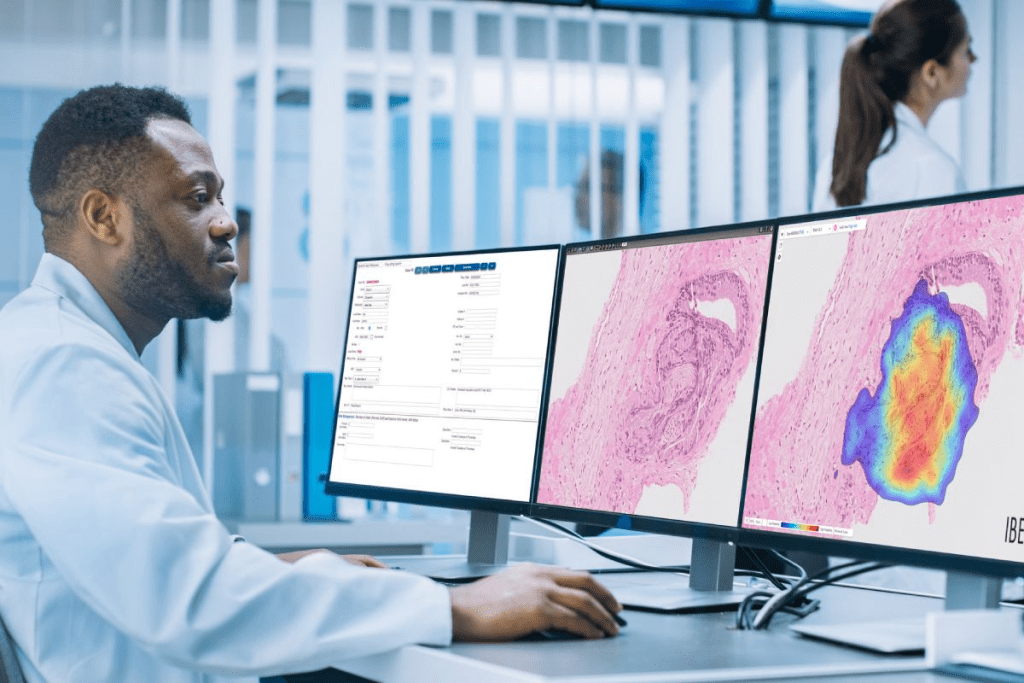It’s important to be aware of cancer symptoms early. Delayed diagnosis can reduce the chances of successful treatment. Experts recommend seeing a doctor if unusual symptoms persist for more than 4-6 weeks.

Cancer is a bi\g health issue. Knowing its signs can help find it early. This leads to better treatment options. This article will cover 20 warning signs you shouldn’t ignore.
Key Takeaways
- Early detection of cancer improves treatment outcomes.
- Unusual symptoms lasting over 4-6 weeks should be evaluated.
- Being aware of cancer signs can lead to timely medical intervention.
- 20 warning signs of cancer will be discussed.
- Prompt medical evaluation is key for effective treatment.
The Critical Importance of Early Cancer Detection
Knowing the signs of cancer is vital for early detection and better survival chances. Finding cancer early can greatly improve treatment success and survival. Spotting the warning signs early can lead to a quick medical check-up, possibly catching cancer in its early stages.

The timing of when cancer is found is very important. Waiting too long can let cancer grow and become harder to treat, making treatment more complicated and possibly lowering chances of a good outcome.
How Delayed Diagnosis Impacts Treatment Outcomes
Diagnosing cancer late makes treatment tougher because it’s more likely the cancer has spread, requiring more complex therapies.
Cancer Statistics in the United States for 2025
- Estimated 2.0 million new cancer cases
- 618,000 projected cancer deaths
These numbers highlight the critical need for early cancer detection. Recognizing common cancer symptoms early can improve survival rates significantly.
Common Cancer Symptoms You Shouldn’t Ignore
Cancer symptoms often start subtly but spotting them early can make a big difference.
- Unexplained Weight Loss
Losing weight without trying is a red flag, especially for cancers like pancreas, stomach, esophagus, or lung. - Persistent Fatigue
Cancer-related fatigue doesn’t improve with rest and is linked to leukemia, lymphoma, and colon cancer. - Chronic Pain
Pain from tumors pressing on organs or nerves, especially in the back, pelvis, or abdomen, may signal ovarian, pancreatic, or colorectal cancer.
Digestive System Warning Signs
Digestive changes can indicate cancers of the stomach, intestines, or esophagus.
- Changes in bowel habits like diarrhea or constipation
- Difficulty swallowing (dysphagia)
- Persistent indigestion or discomfort
- Early fullness (satiety) and bloating
Recognizing these cancer symptoms early can save lives. If persistent, consult a healthcare professional.
This content integrates insightful cancer statistics and expands on cancer symptoms while emphasizing early detection’s critical role in treatment outcomes. Let me know if the content needs further refinements or SEO keyword integrations.
Related
What are the most sensitive screening tests for digestive cancers
Common Cancer Symptoms You Shouldn’t Ignore
Knowing the signs of cancer is key to getting help early. Cancer often shows itself in small ways that are easy to miss. Spotting these signs early can make a big difference in treatment.
1. Unexplained Weight Loss
Many cancer patients lose weight without trying. Losing weight without trying is a red flag, often seen in cancers of the pancreas, stomach, esophagus, or lung. If you’re losing weight without dieting, see a doctor to find out why.
2. Persistent Fatigue
Don’t ignore feeling tired all the time. Cancer fatigue doesn’t get better with rest and can be very tough. It’s linked to cancers like leukemia, lymphoma, and colon cancer. If you’re always tired, talk to your doctor about it.
3. Chronic Pain That Doesn’t Subside
Persistent pain is another warning sign. This pain comes from tumors pressing on nerves, bones, or organs. Persistent pain in the back, pelvis, or abdomen might mean cancers like ovarian, pancreatic, or colorectal. If you have ongoing pain, get it checked by a doctor.
Digestive System Warning Signs
Digestive problems can be more than just annoying. They might show serious health issues like cancer. The digestive system, including the stomach, intestines, and esophagus, is key to our health. Any unusual changes can be warning signs.
Changes in Bowel Habits
One big sign of cancer is a lasting change in how you go to the bathroom. This could be diarrhea, constipation, or changes in stool consistency. If these changes keep happening, see a doctor to check for colorectal cancer.
Difficulty Swallowing
Having trouble swallowing, or dysphagia, is a symptom that needs attention. It might mean you have esophageal cancer, where food can’t pass through the esophagus. Catching it early is key for treatment.
Persistent Indigestion or Discomfort
Stomach pain or discomfort in the upper belly can hint at stomach cancer. While common indigestion might come from diet or stress, don’t ignore persistent or severe pain.
Early Satiety and Persistent Bloating
Feeling full quickly or persistent bloating can signal stomach or ovarian cancer. These signs might mean a tumor is affecting digestion or how your body processes food.
Knowing these signs and symptoms of cancer in the digestive system can help catch it early. This could save lives. If you or someone you know keeps experiencing these symptoms, getting medical help is vital.
Unusual Bleeding and Discharge as Cancer Indicators
Unusual bleeding and discharge can be alarming symptoms that may indicate underlying health issues, including cancer. It’s essential to be aware of these warning signs to seek medical evaluation promptly.
8. Unexplained Bleeding
Unexplained bleeding is one of the critical warning signs of cancer in your body. This can manifest as bleeding between menstrual periods, after intercourse, or during bowel movements. Such bleeding should be investigated to rule out cancerous conditions.
9. Changes in Bladder Function
Changes in bladder function, such as increased frequency or pain while urinating, can be indicative of bladder or prostate cancer. These symptoms should be evaluated by a healthcare professional to determine the underlying cause.
10. Non-Healing Sores
Non-healing sores or ulcers, particular in the mouth or on the skin, can be cancer signs that require medical attention. These sores may be a sign of oral or skin cancer and should be examined by a doctor.
Being vigilant about these unusual bleeding and discharge symptoms can help in early detection and treatment of cancer. If you experience any of these signs of cancer, consult a healthcare professional without delay.
Visible Physical Changes and Cancer Symptoms
Cancer can show itself through physical symptoms that are easy to see. Knowing these signs can help find cancer early and treat it better.
Skin Changes Including New Moles or Jaundice
Skin changes are common signs of cancer. New moles or changes in old ones might mean skin cancer. Jaundice, which makes skin and eyes yellow, could point to liver cancer.
It’s key to watch for any skin color or texture changes. If you see something odd, talk to a doctor right away.
Unusual Lumps or Tissue Mass
Unusual lumps under the skin might be cancer. These can pop up in places like the breast, testicles, or lymph nodes. Not all lumps are cancer, but it’s smart to get any new or changing ones checked.
Noticeable Changes in Existing Moles
Changes in moles can warn of skin cancer. The ABCDE rule helps spot possible cancer moles: Asymmetry, Border irregularity, Color variation, Diameter increase, and Evolving size or shape. If you see any of these, see a dermatologist.
Watching for visible changes and telling a doctor can really help with cancer diagnosis and treatment.
Respiratory and Vocal Warning Signs
It’s important to know the signs of respiratory and vocal problems early. These signs can mean cancer is present. Spotting them early can lead to quicker treatment.
Persistent Cough or Hoarseness
A cough or hoarseness that lasts more than a few weeks might mean cancer. Doctors say a cough that won’t go away or voice changes need checking. “A persistent cough is one of the most common symptoms reported by patients with lung cancer,” notes research.
Seeing a doctor for these symptoms is key. It helps catch cancer early.
Shortness of Breath Without Exertion
Feeling short of breath without trying hard is a warning sign. This is called dyspnea and can mean lung cancer or other breathing issues. If you get out of breath easily, see a doctor.
Recognizing these symptoms can save lives. If you notice them, get medical help right away.
Unexplained Fever
An unexplained fever can be a cancer symptom seen in cancers like lymphoma or leukemia. If you keep getting a fever without a clear reason, it is important to see a doctor.
Night Sweats
Drenching night sweats might indicate lymphoma, among other conditions. If you frequently wake up hot without a clear cause, it’s wise to get checked. Night sweats are more than just occasional warmth at night”they can be a serious cancer symptom.
Recurrent Infections
Frequent infections could mean your immune system is compromised, which is common in cancers such as leukemia or lymphoma. If you keep getting infections, discuss this cancer symptom with your healthcare provider.
When Multiple Symptoms Occur Together
Experiencing several cancer symptoms at once”like fever, night sweats, and infections”is a strong warning sign. Pay close attention to how your body feels and seek medical advice quickly if you notice these symptoms.
Recognizing these systemic cancer symptoms can help with early detection. If you experience any of these signs, consult a doctor promptly to determine the cause and start appropriate treatment.
Conclusion: When to Seek Medical Evaluation
It’s important to know the key cancer symptoms and warning signs in your body. This knowledge helps in early detection and treatment success. If you notice symptoms like unexplained weight loss, chronic pain, or unusual bleeding, see a doctor promptly. Experts recommend medical evaluation if cancer symptoms last more than 4-6 weeks. Liv Hospital, for example, offers advanced cancer care combining the latest medical approaches with patient comfort. Staying alert to any cancer symptoms and changes in your body can greatly improve your treatment chances. Taking proactive care of your health is crucial.
FAQ
What are the early warning signs of cancer that I should be aware of?
Look out for unexplained weight loss and persistent fatigue. Also, watch for chronic pain, changes in bowel habits, and trouble swallowing. Unusual bleeding or discharge is another sign.
How long should symptoms last before seeking medical evaluation?
If symptoms last more than 4-6 weeks, it’s time to see a doctor.
What are some common symptoms of cancer that should not be ignored?
Don’t ignore unexplained weight loss, persistent fatigue, and chronic pain. Also, changes in bowel habits, trouble swallowing, and unusual bleeding or discharge are red flags.
Can changes in bladder function be a sign of cancer?
Yes, changes in bladder function can signal cancer. Look out for unusual bleeding or discharge too.
What are some visible physical changes that can be symptoms of cancer?
Watch for skin changes, unusual lumps, and changes in moles. These can be signs of cancer.
Are respiratory symptoms like persistent cough or hoarseness related to cancer?
Yes, symptoms like persistent cough, hoarseness, and shortness of breath without exertion can warn of cancer.
Can systemic symptoms like unexplained fever and night sweats indicate cancer?
Yes, unexplained fever, night sweats, and recurrent infections can hint at cancer. This is true if you have multiple symptoms.
What should I do if I’m experiencing multiple symptoms that could be related to cancer?
If you have several symptoms that could be cancer, get medical help right away.
How can I reduce my risk of cancer or detect it early?
While some risks can’t be changed, knowing the signs and getting checked if symptoms last can help find cancer early.
References
- Hashmi, S., Berg, F., Mikkelsen, M. K., Bhatt, N., Inaba, H., & Moreira, D. C. (2025). Pediatric hematology/oncology fellowship trends in the United States: Analysis from 2008 to 2025. Pediatric Blood & Cancer, e32070.


































